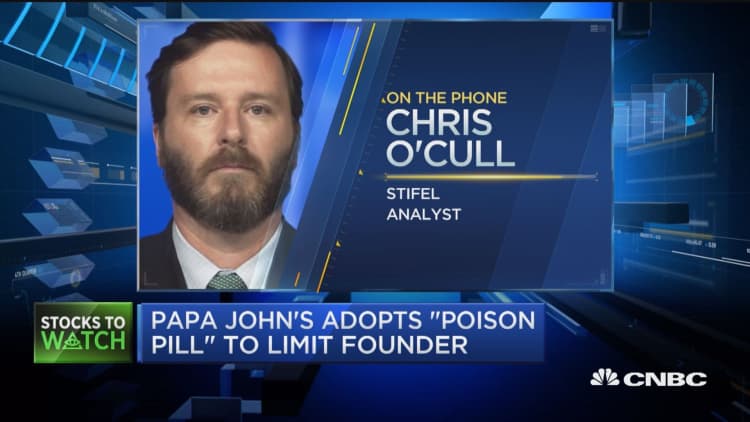
The ongoing battle between Papa John's and its founder is putting the company in a precarious position, threatening not just future sales, but employee and franchisee commitment to the brand, an analyst said, as he downgraded the stock to sell from hold.
Shares of Papa John's fell nearly 10 percent in afternoon trading Monday to a 52-week low, on pace for its worst day since November 2015 when the stock plummeted on a weak earnings report. The stock is down more than 30 percent over the last year.
"The outlook for Papa John's is growing dimmer with recent media reports citing a fraternal corporate culture that is reinforcing consumer perception that Papa John's is not a trusted brand," Chris O'Cull, a Stifel analyst, wrote in a research note Sunday.
Papa John's is attempting to distance itself from its disgraced founder John Schnatter, who used racist language during a media training call with its marketing agency. Although Schnatter resigned from his position as chairman, the board took an additional step of enacting a shareholder rights plan, or a "poison pill," to prevent Schnatter from acquiring a controlling stake in the company.
Schnatter owns nearly 30 percent of the company's shares, but some have called for him to step down from the board.
O'Cull foresees irreparable damage to Papa John's same-store sales, a key metric for restaurant companies, especially as employee morale shrinks and customers view the brand in a negative light.
In addition to Schnatter's comments on the call, for which he has apologized, there was another report that painted a picture of a very toxic culture at the company. A special committee of Papa John's board has hired an outside firm to audit and investigate the company's culture and implement any needed changes.
Tracking comments on social media in recent days, Stifel estimates the pizza brand's sentiment score is a negative 48, compared with a positive 56 for Domino's and a positive 46 for Pizza Hut.
"We believe the company is in a precarious position — needing a strategic savior but struggling to find one willing to underwrite a transaction given the brand damage," O'Cull wrote.
He said that recent checks made by Stifel indicated that same-store sales have declined in the mid-teens in the last several days. Because of this, O'Cull lowered his third- and fourth-quarter estimates for the company's domestic same-store sales. He expects same-store sales will fall 12 percent in the third quarter, and drop 10 percent in the fourth.
O'Cull also estimated that the average franchisee's annual store cash flow will fall to $60,000 in 2018 from $95,000 in 2016. He said that Papa John's may need to provide royalty relief or other financial assistance to keep franchisees from closing their locations.
"The implications of the current situation are far-reaching," O'Cull said. "For example, employee morale is likely extremely low at the corporate office and in the field following media reports about senior executive behavior and with the likelihood compensation and continue employment could be at risk from the declining sales."
Papa John's did not respond to a request for comment.


